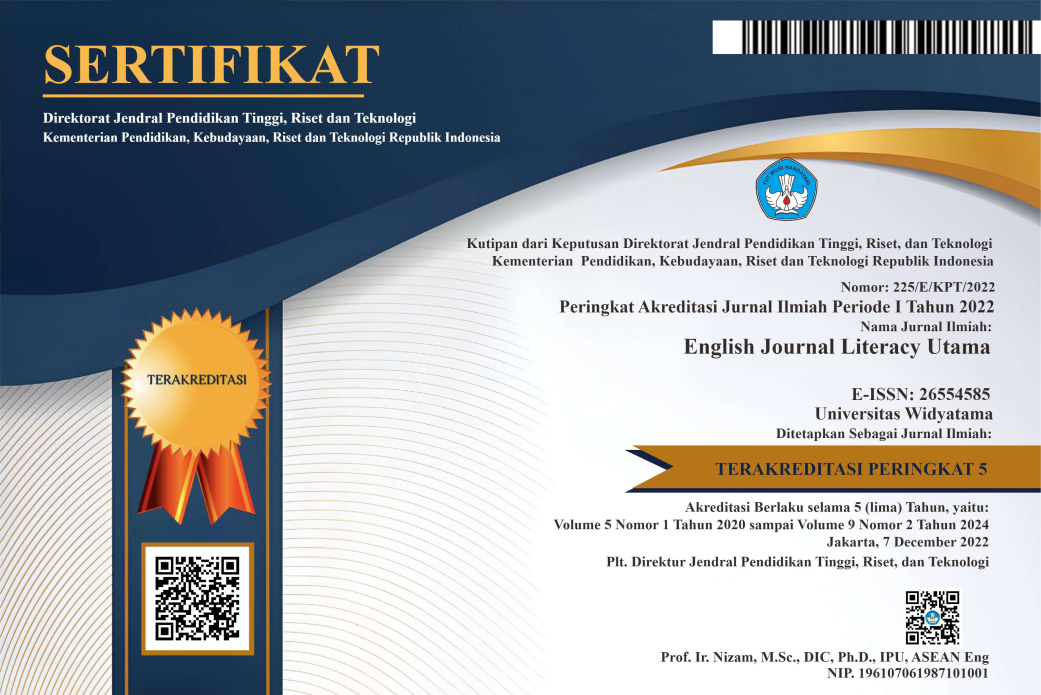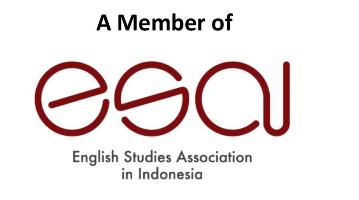Exploring Parents' Attempt to Conduct Home Literacy Practices for Young Learners
DOI:
https://doi.org/10.33197/ejlutama.v7i1.182Keywords:
Home literacy, Parents, Home literacy practices, children, parents’ attemptAbstract
In Indonesia, it is quite hard to find a study that raised the topic of home literacy even though the topic is very important to discuss. This research will provide an overview of how parents in Indonesia carry out home literacy practices with their children. Thus, this research aimed to explore the types of home literacy practices by Indonesian parents. The researcher collected the data through an interview via Zoom meeting as a method of this research. The data were transcribed and codified under the theory of Burgees, Hect, and Lonigan (2002). For analyzing the data, the researcher uses a thematic analysis. From the findings, it can be known that the mother played a big role in the sustainability of home literacy. While the father’s role in supporting and teaching the Quran or reciting Surah. There are four roles in conducting home literacy as performed by the parents who had the same level of education and from middle and upper economic background. These are the limiting environment, the literacy interface, the active home literacy environment, and the passive home literacy environment.
References
Alshatti, T., Sulaihim, N., & Abdalla, F.(2020) Home-Based literacy practices of Arab mothers from Kuwait, Speech, Language and Hearing, 23:3, 133-145, DOI: 10.1080/2050571X.2019.1581464
Badroeni, Erik, & Cahyati, N. (2020). Kegiatan Home Literacy Dalam Mengembangkan Kemampuan Awal Membaca Anak Usia Dini Di Masa Wfh. Jurnal Golden Age, Universitas Hamzanwadi Vol. 04 No. 1, Juni 2020, Hal. 160-166.
Barza, L., & von Suchodoletz, A., Home literacy as cultural transmission: Parent preferences for shared reading in the United Arab Emirates, Learning, Culture and Social Interaction (2016), http://dx.doi.org/10.1016/j.lcsi.2016.08.002
Braun, V., & Clarke, V. (2012). Thematic analysis.
Burgess, S., Hecht, Steven., Lonigan, C. (2002). Relations of the Home Literacy Environment (HLE) to the Development of Reading-Related Abilities: A One-Year Longitudinal Study. Reading Research Quarterly - READ RES QUART. 37. 408-426. 10.1598/RRQ.37.4.4
Claire E. Baker (2013) Fathers' and Mothers' Home Literacy Involvement and Children's Cognitive and Social Emotional Development: Implications for Family Literacy Programs, Applied Developmental Science, 17:4, 184-197, DOI: 10.1080/10888691.2013.836034
Curry, D. L., Reeves, E., & Mcintyre, C. J. (2016). Connecting schools and families: Understanding the influence of home literacy practices. Texas Journal of Literacy Education, 4(2), 69-77.
Guo, Y., Puranik, C., Kelcey, B., Sun, J., Dinnesen, M., & Breit-Smith, A. (2020). The Role of Home Literacy Practices in Kindergarten Children’s Early Writing Development: A One-Year Longitudinal Study. Early Education and Development. 32. 1-19. 10.1080/10409289.2020.1746618.
?nce, Murat & Gözütok, F.. (2018). Effect of Parental Education and Home Educational Resources to Students' Results of PISA Reading Skills Test. ?lkö?retim Online. 17. 947-958. 10.17051/ilkonline.2018.419346.
Juliah, D., Musthafa, B., & Wirza, Y. (2021, April). Home Literacy Environment to Support the Teaching English to Young Learner (TEYL). In Thirteenth Conference on Applied Linguistics (CONAPLIN 2020) (pp. 83-89). Atlantis Press
Lynch, J. (2019). Father Reflections on Their Involvement with Primary School Students: Connections to School Literacy and Learning. Literacy Research: Theory, Method, and Practice 2019, Vol. 68, 396-416.DOI: 10.1177/2381336919870210 journals.sagepub.com/home/lrx
Nuswantara, K. et al. (2022). Investigating the Relationship between Home Literacy Environment (HLE) Activities and Emergent Literacy Skills Development. International Journal of TESOL & Education, 2(3), 96-113. DOI: https://doi.org/10.54855/ijte.22237
Parlindungan, F. (2017). Exploring Literacy Practices in a Second Language. TEFLIN Journal, 28(1), 115-132.
Ponzetti, J. and Bodine, W.: (1993), ‘Family literacy and parent education’, Adult Basic Education 3, 104–108.
Stutzel, Megan. (2019). Impact of Parental Involvement on Literacy Skills in Early Childhood.
Widya, Y., & Rintaningrum, R. (2020). The Importance of Literacy For The Millennial Generation.
Downloads
Published
Issue
Section
License
Copyright (c) 2022 Shafa Nurafifah

This work is licensed under a Creative Commons Attribution-NonCommercial-ShareAlike 4.0 International License.
Creative Commons Attribution-ShareAlike 4.0 International License















